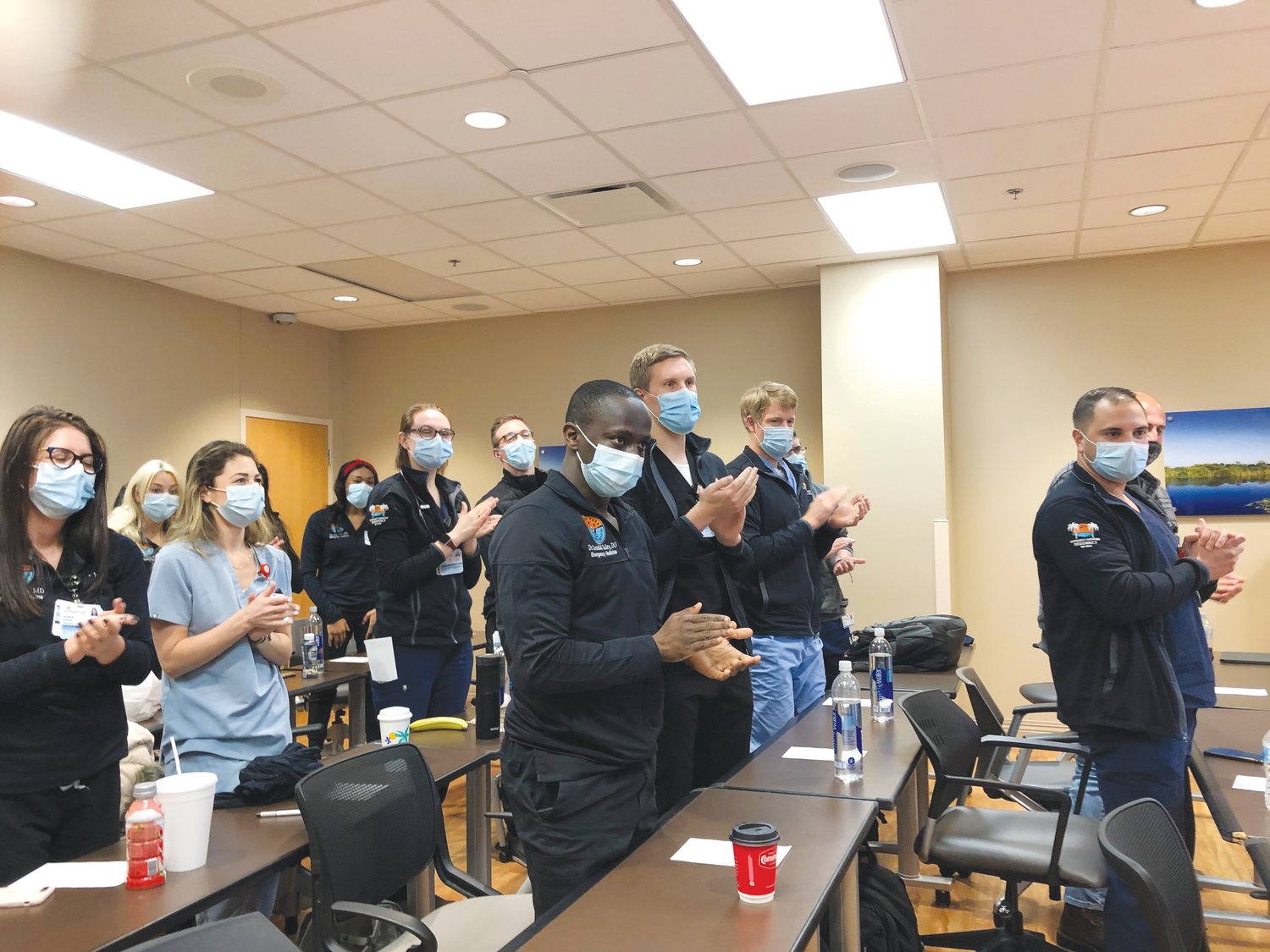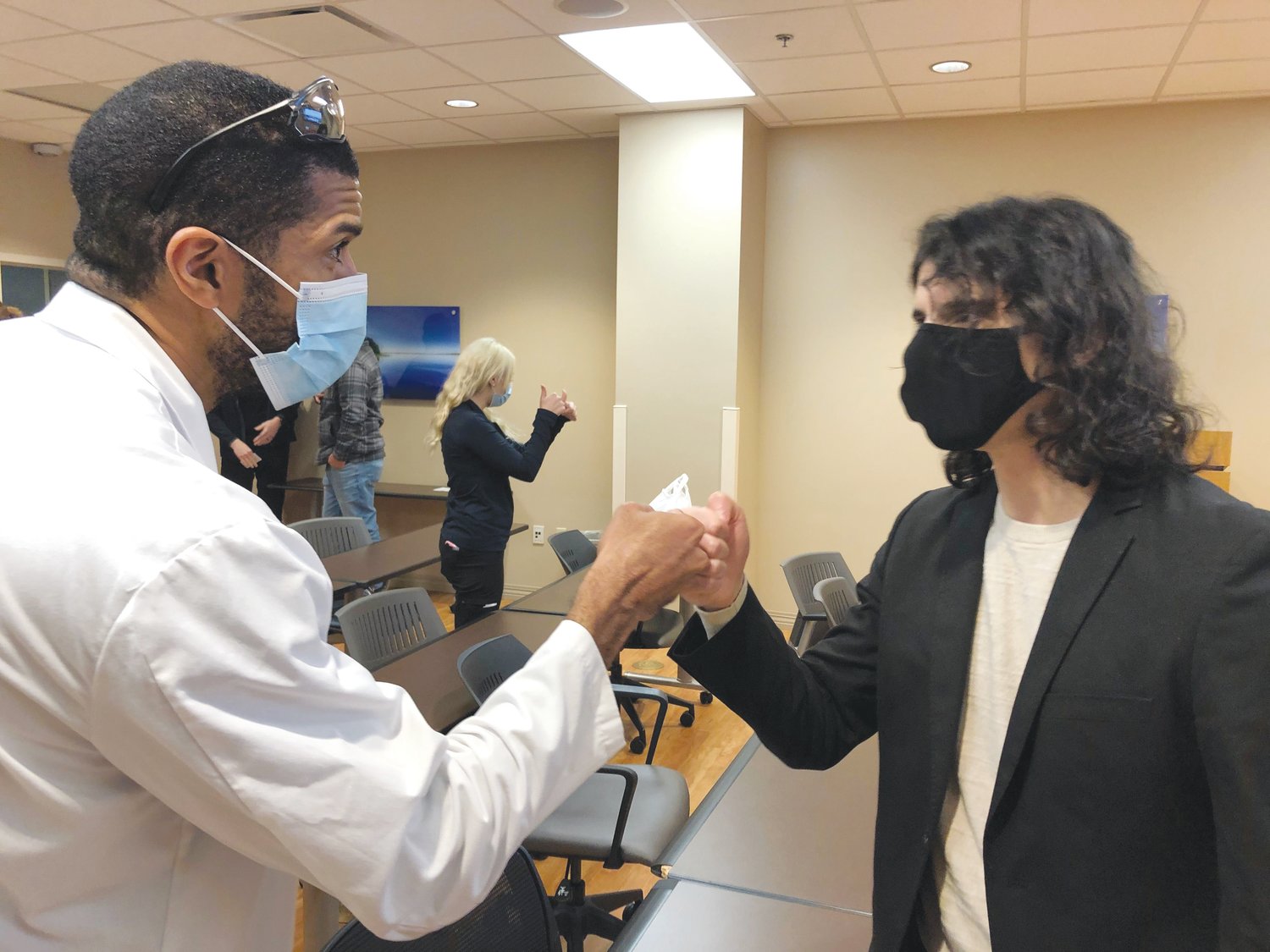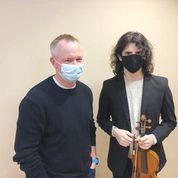Violinist Michael Tropepe gives command performance at OPMC
Special performance follows a month after arriving to ER with no heartbeat
ORANGE PARK – Michael Tropepe has played in some of the grandest concert halls around the world. For years, thousands have donned coats and tails for an evening of classical violin pieces.
But …
This item is available in full to subscribers.
Attention subscribers
To continue reading, you will need to either log in to your subscriber account, or purchase a new subscription.
If you are a current print subscriber, you can set up a free website account and connect your subscription to it by clicking here.
If you are a digital subscriber with an active, online-only subscription then you already have an account here. Just reset your password if you've not yet logged in to your account on this new site.
Otherwise, click here to view your options for subscribing.
Please log in to continueDon't have an ID?Print subscribersIf you're a print subscriber, but do not yet have an online account, click here to create one. Non-subscribersClick here to see your options for subscribing. Single day passYou also have the option of purchasing 24 hours of access, for $1.00. Click here to purchase a single day pass. |
Violinist Michael Tropepe gives command performance at OPMC
Special performance follows a month after arriving to ER with no heartbeat
ORANGE PARK – Michael Tropepe has played in some of the grandest concert halls around the world. For years, thousands have donned coats and tails for an evening of classical violin pieces.
But of all the stages, Tropepe said his best performance came in the echoey hallways of an Intensive Care Unit and at a hospital conference room for a handful of medical people dressed in scrubs, while doctor coats and masks.
The professional violinist returned to Orange Park Medical Center on Wednesday, Jan. 13., for what he called the most-important concert of his life, playing a short program for the people who saved his life.
For minutes, the music really died for Tropepe on Dec. 5. He was brought into the OPMC with no pulse after collapsing in his garage. Emergency Room doctors and nurses revived him, followed by critical care for days in Intensive Care.
Less than a week after walking out of the hospital, Tropepe returned with his violin to say thank you the best way he knew – with his music.
“I immediately responded that would be terrific,” Tropepe said. “I did the show in case I never see those people again. They did such a great job. You want them to know how appreciative you are.”
He played “Allemande, “Corrente” and “Giga” from Johann Sebastian Bach’s Partita in D minor, Niccolo Paganini’s “Paganini Cantabile” and Henryk Wieniawski’s “Etude No. 4 for Two Violins” while doctors, nurses and technicians watched. For most, it was the greatest show appreciation yet during a year of COVID-19 and shutdowns.
“To have an event like this, where you really get to see the people’s life that you’ve impacted, not only professionally, but personally, it’s a constant reminder of why we do what we do, why we make the sacrifices that we make,” said Emergency Room Physician Dr. Justin Deaton. “It’s special to connect with someone at that level. I didn’t know Michael before he came to the hospital. Now, through our brief interaction here, I feel like I know him and I’ve connected with him. I think about that every time a patient comes through the hospital. This is a person with a family, with feelings, with pets, who has their whole life ahead of them.
“I hope our young learners, our residents, understand the message that we have a special ability to positively affect lives, especially nowadays when we constantly get negative things. We’re constantly dealing with COVID and young people who die. There’s nothing you can do about it when you’re dealing, in general, with healthcare issues.”
Tropepe was diagnosed with Wolff-Parkinson-White syndrome a year ago. It’s an ailment where the electrical pathway in the heart causes rapid heartbeat. Some of his treatment since was derailed by the restrictions put in place for COVID-19.
Shortly after his girlfriend found him collapsed on his Orange Park garage floor, EMS found his pulseless at the scene and started CPR. He was revived, but he remained on life support for 10 days.
Once off life support, concern shifted to his brain activity.
“When you get cases like that where their heart is not beating and their brain isn’t getting any oxygen, you’re working against the clock,” Dr. Deaton said. “Just by nature, the odds are against you. The quicker you act, the sooner you can restore their circulation and get oxygen to the brain, the better their chances. When your heart stops, there’s something seriously wrong with you. The odds are not in your favor. It’s a challenge when someone comes [here] in that extreme condition to completely resuscitate them and treat them to the point where they are then able to walk out of the hospital – completely without any lasting effects from that event.”
Tropepe’s father told doctors his son wanted his violin. They thought it was a good way to see if there was any loss of memory during his medical emergency. Tropepe soon started playing music in his hospital room, and it brought a unique sense of joy and calm to everyone on the ward, Dr. Deaton said.
“The doctors thought, well when someone’s brain is deprived of oxygen, you never know how long it will take be firing back on all cylinders,” he said. “Anything that’s familiar to him, can start that process earlier. You get their synapsis firing in parts of their brain, the sooner you implement that, the more likely they are to improve quite quickly.
“Let’s bring the violin in, let him play it and see if it jumpstarts some things, get is mind back on track. On top of that, it was nice to hear a professional musician playing this classical music during day. Patients, families and nurses and doctors all really enjoyed the experience.”
For Tropepe, the violin not only brought normalcy back to his life, it proved to be therapeutic.
“I was practicing during my stay at the hospital,” he said. “They brought a violin in there for me to play. I was itching to play again after being there for a week. That meant so much to me. It was wonderful to play again.”
Other than some short-term memory loss, Tropepe said he didn’t suffer any significant damage. Weeks after being brought back from the dead, he was back on the road performing in concert halls this week.
“I’ve never heard someone play the violin like that,” Dr. Deaton said. “Literally one month ago, he was in the ICU on life support. Now he was standing in front of us playing the violin at a level that blew us away. I can explain parts of the medicine to you, but there are certain times there are things I can’t explain. This falls in that category.”













